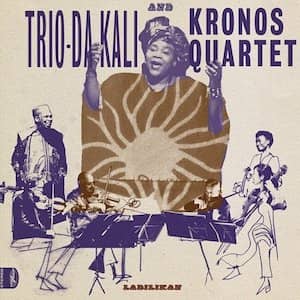 Trio Da Kali And Kronos Quartet: Ladilikan
Trio Da Kali And Kronos Quartet: Ladilikan
World Circuit – 15 September 2017
I’ve railed before against what I call the Anglo-Saxon obsession of modern culture, especially when it comes to music. Sadly, it often seems that musicians all over the world feel like they have no choice but to-badly- imitate British and American music. Not only does this create a numbing conformity, but it also cheapens the great musical traditions-blues, gospel, soul, jazz, rock, folk-that Western popular music is based on. Not to mention the fact that it ignores 90% of all the wonderful musical traditions and styles that exist in the world. No Bueno, in other words. And of course, critics, labels, and so on are part of the issue as well.
I’m going to resist going off on a political rant here, but it’s hard not to see this phenomenon as part of our postcolonial narrative, in which the West is seen as an enlightened civilization superior to, well, everywhere else, especially all those lands our forefathers invaded, plundered and ‘civilized’.
Ladilikan is a firm departure from that. In fact, it is more than a departure: a bold fusion of the musical traditions from the West and those of Africa, more specifically of the Mali griot tradition, here represented by Trio Da Kali. Francis Bebey writes about the griot in African Music, A People’s Art:
“The West African griot is a troubadour… he knows everything that is going on… He is a living archive of the people’s traditions… There are many women griots whose talents as singers and musicians are equally remarkable (as the men).”
The modern classical tradition is represented by the venerable Kronos Quartet, no strangers to musical adventurism. Their exploits have included collaborations with artists like Steve Reich and Tom Waits, and they’ve been known to end concerts with a raucous rendition of Purple Haze, complete with violins, viola and cello unleashing waves of screaming feedback worthy of Jimi himself.
Collaborations like Ladilikan often fall short, as the difficulties of gracefully blending very different musical traditions can overwhelm the best of intentions. Rest assured: such is not the case here. Both traditions are represented equally, and across cultural and lingual boundaries, Western tempered scale instruments blend seamlessly with traditional African instruments, creating a wonderful musical hybrid that is engaging, fascinating and irresistible. The Trio da Kali’s line up is Hawa Kassé Mady Diabate – vocalist , Lassana Diabaté –balafon ( a type of marimba) and Mamadou Kouyaté – bass ngoni (stringed instrument)
Ladilikan starts off with the Trio laying down one of those endlessly deep spiritual African grooves on the song Tita. Kronos Quartet initially keep a respectful distance, gently moving from simple chords to a more elaborate melodic arrangement. They return to their role as an extension of the groove before taking the track to its climactic ending. A promising start to an ambitious collaboration.
Presenting perhaps the most successful musical hybrid is Kanimba with Kronos providing harmonic support that both cushions the vocals and strengthens the already formidable rhythmic foundation of the track. A match made in musical heaven and an impressive feat of cross-cultural musical arranging.Eh Ya Ye follows a similar pattern. Highlights are the soaring balafon solo and Psycho-style violin screeches towards the end.
God Shall Wipe all Tears Away is based on a spine chilling harmonic drone laid down by Kronos, over which Diabate sings a beautiful Malinese melody. This stunning marriage of Africa and the West evokes anything and everything from gospel to Irish ballads, from world music to drone-based musical experiments. Goosebumps. Misty-eyed. A candidate for the track of the year!
Sunjata is an understated closer. It wobbles gently over meandering balafon until it is joined by bass ngotii, percussion and plucked stringed instruments. A wonderful feat of subdued beauty and a great closer to an uplifting release.
If it is true that music crosses all boundaries and connects all of us with our common humanity, regardless of the usual divisions, then Ladilikan shines brightly as a wonderful example of putting that idea into practice. We live in challenging times, when the old demons of racism, xenophobia and bigotry are once again raising their ugly head, precisely at a time when humanity as a whole is faced with an ecological disaster that threatens our very survival as a species. Perhaps collaborations like this can, in their own small way, show the road ahead for all of us.
p.s. As of this writing, this review has suddenly become a lot more pertinent, since a white supremacist murdered a counter demonstrator in cold blood and injured 19 others by running them over with his car at a white supremacy rally in Virginia. It seems those old demons are alive and well.
Pre-Order via Amazon: http://amzn.to/2vKU5nT

